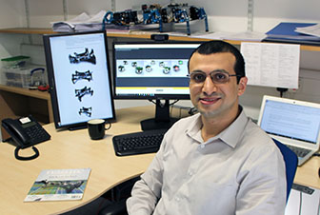Feb 26 2018
 Dr Danesh Tarapore. (Credit: University of Southampton)
Dr Danesh Tarapore. (Credit: University of Southampton)
As part of an innovative project funded by the Engineering and Physical Sciences Research Council (EPSRC), scientists from Electronics and Computer Science (ECS) at the University of Southampton will use machine learning and bio-inspired algorithms to create fault-tolerant robotic swarms.
Dr Danesh Tarapore, Assistant Professor at ECS’s Agents, Interaction and Complexity research team, will head the New Investigator Award project that will form groups that can readily discover defects and adapt to changes in the environment, thereby opening the door for real-world applications such as keeping track of contaminants in large water bodies.
Close partnership with project partners will enable the development of next-generation robot swarms with the potential for continued operation for extended time periods without the need for human intervention.
Robots are increasingly becoming an important part of our day-to-day lives, automating tasks like keeping our homes clean and packing parcels at large warehouses. Our aging population and the need to substitute human workers in dangerous and repetitive tasks mean that new tasks are emerging on the horizon, such as automation in agriculture and environmental monitoring. This will require robots to do more and work in large-numbers as part of a swarm, acting over vast areas and efficiently performing their mission. However, robot swarms to date are not prepared for deployment; unable to deal with the inevitable damages and faults sustained during operation, they remain frail systems that cease functioning in difficult conditions. The goal of this project is to remedy this situation by developing algorithms for robot swarms to rapidly—in no more than a few minutes—recover from faults and damages sustained by robots of the swarm.
Dr Danesh Tarapore, Assistant Professor at ECS’s Agents, Interaction and Complexity Research Team
Prevalent fault-tolerant systems for robot swarms have the ability to diagnose only difficulties predicted beforehand by the designer. Danesh suggests that robotics surpass these conventional approaches because the entire scenarios a swarm might encounter cannot be anticipated while functioning in complicated environments for extended time periods. His new study, titled “Rapid fault-recovery strategies for resilient robot swarms,” will form the base for next-generation robotics by creating nature-inspired computing algorithms and data-efficient machine-learning.
The innovative strategy will allow robots to adapt their functioning to continued defects within the swarm by acquiring knowledge through new trial-and-error compensatory movements that hold well regardless of the defects. The ensuing system of working swarm functions will pave the way for innovative applications for long-term deployment. Danesh has already planned a swarm of autonomous surface vehicles with the potential to monitor large water bodies for contaminants.
EPSRC’s New Investigator Award is a new project that supports scientists newly entering their first academic lectureship position. Danesh is the first scientist in Southampton’s Faculty of Physical Sciences and Engineering to receive the award which offers £250,000 for the next 2.5 years, and will partner with the Southampton Marine and Maritime Institute as well as project partners ASV Global, MBDA UK Ltd, and INRIA Lorraine.